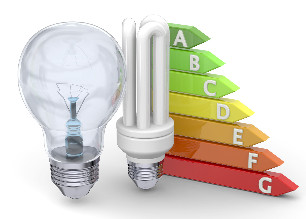Efficient use of energy, sometimes called energy efficiency and energy saving, is the goal to reduce the amount of energy for the provision of products and services.
Energy efficiency and energy conservation can be defined as the energy consumption for the provision of this service and, in General, relate to the improvement of these relations.
Increase in energy efficiency means the improvement of the energy characteristics of the technical mechanism for the delivery of various types of energy, but also a better control of the organization or of the energy consumption.
Energy is inextricably linked with the economic and social development, so it is easy to imagine that this trend may be a means to achieve political objectives outside the energy sector. Some of the results can be indirectly or may be the result of a chain of actions, which are difficult to belong to this concept.

Nevertheless, it can be assumed that measures to increase energy efficiency and energy savings impacts on different sectors of the economy, often in different areas at the same time, but have a direct impact in one area of the economy can have an impact on the other.
Traditionally, the focus in this area is the use of less energy for the same energy services. But it can also be consumed to increase the scope of services for the same amount of energy.
Therefore, the increase in energy efficiency can be achieved, to ensure if there is either less energy consumption, is the same level of services consumed either the same energy, a higher level of services. Measures for energy efficiency and energy saving focused on can be, mainly:
- rational use of energy;
- Mode Energy Saving.
Energy efficiency and energy saving is an important aspect and aim of the activities, such as the reduction of losses in electricity production or an increase in the industrial activities. Both forms are important.
Understanding of the wave the effect of the may policy as a result of energy efficiency improvements and energy savings in the economy as a whole will be helpful in the development of a targeted.
Here are the different benefits of energy efficiency at the individual/industry/public/international typology were. Many of the advantages of energy efficiency and energy saving: increase significant many benefits in a wide range of sectors.
List the broader the many benefits that can be achieved with these measures:
Advantages in increasing the energy efficiency and energy saving
Health and well-being
Particularly convincingly proved the positive impact of energy efficiency and energy savings in the field of housing on the health of the population and the associated social consequences. A wide spectrum of diseases, especially of respiratory diseases and Asthma in children, are closely areas with cold temperatures, moisture and mold in homes.
The increase in energy efficiency and energy saving in the building sector, in particular, bring a wide range of tangible benefits for the health of the residents of residential houses, office workers and many other groups, as well as the total population. Health effects to the same extent on the inefficient housing and appliances.
The fight against poverty and the availability of energy
To the high energy prices and financial constraints of the poor often can not afford to, are forced enough services for the maintenance of healthy living conditions, not enough heating at home, have to endure poor air quality in the premises and/or deny, other necessities such as food: a phenomenon sometimes known as "heat or eat". This Situation is usually described as "Fuel poverty". Energy efficiency and energy saving can this Problem by the adoption of measures at the level of the private households reduce energy costs through insulation and Design, the delivery of effective devices and systems for space heating and domestic hot water preparation and lighting, as well as the training of efficient use of energy among the tenants.
Access to energy services is of fundamental importance for the output of people out of poverty through the provision of raw materials for the economic and social development. Measures to increase energy efficiency, the suppliers of energy, free up additional resources by reducing technical losses in their systems of production and distribution of energy.
Industrial productivity and competitiveness
There are many improvements in industrial productivity, the energy efficiency of production and energy saving. The increase in profit, safer working conditions, costs, durability, and the improvement of the quality and the production, reduction of investment and operation and the reduction in consumption of scrap and energy. Advantages of receive sectors can be at the global level by improving the competitiveness and may affect daily working conditions, safety and job satisfaction of individual employees
Benefits for the providers of energy and infrastructure

At first glance, it may seem that energy efficiency and energy conservation contrary to the commercial interests of the providers of energy. Studies show, however, that the energy suppliers receive a lot of benefits in terms of providing more high-quality energy services to customers, reduce operating costs and increase profits.
Up to 10% of all of the benefits from measures to increase the likely to be charged directly to the suppliers of energy, which explains why many utilities are already taking ambitious measures to control the demand, to stimulate, in many countries, legal obligations in this area.
The increase in the value of assets
There is some evidence that investors are willing to pay the rent and the premium for the sale of the property with the best energy efficiency.
For example, energy is one of the highest operating cost in most offices, therefore, the future energy savings, the present value in addition to the price for resale. Studies show that the market reflects more and more this line of reasoning.
Existing analyses of data demonstrate that "green" buildings for sale increased again in value and rental rates, but also offer a wider range of services outside of the assets: they have higher numbers of employees, more comfort, lower maintenance costs, and lower prices, higher capitalization and Performance gains.
Job creation
Investments in programs for energy efficiency and energy conservation have a significant potential for the creation of jobs with a short lead time. A pure improvement in the employment-expenditure can be explained by the programmes through the increase of direct job creation and indirectly, by excessive consumption in addition to the other services for the public sector, such as the reduction of unemployment benefits. Direct jobs in the implementation of measures to improve the energy efficiency and energy saving is most easily measurable, and you will probably much. Indirect jobs can also be created in the production of raw materials, but these jobs can space either within a time a specific program.
Reduction of the state expenditure in connection with energy, is the perspective of the public sector as a separate unit of the economy. The increase in energy efficiency and energy savings will help, the burden on the national budgets and an improvement in the financial balance.
Energy security
Energy efficiency plays a role in reducing countries ' dependence on imports to satisfy their needs and thus to the formation of diverse energy balance. The consequences of the permeate, energy security, structurally dependent on the energy sector in a given country.
The macro-economic effects
The increase in energy efficiency and energy savings lead to significant positive macro-economic consequences such as the increase of GDP, the trade balance, the restructuring of the economy, employment and national competitiveness. You can have a significant impact on the budget of the country. Investments in this direction suggest the translation of the capital with energy to less energy-intensive activities.
This has significant consequences for the economy and energy Management in General, if the translation involves the restructuring of the economy on the labour-intensive activity.
Reduction of emissions of greenhouse gases
The increase in energy efficiency and energy conservation lead to a reduction in the consumption of energy from fossil fuels and to reduce emissions of greenhouse gases. Really, the measures are expected to reduce carbon dioxide emissions by 2035, will contribute to 44%, in order to achieve a Chance to the international objectives in the area of climate change.
Compared with other measures to reduce greenhouse gas emissions, increase energy efficiency, usually cost-effective and can be quickly implemented. Reduction of the emissions already recognized as one of the most important results of the energy efficiency measures and is often measured as a matter of course in the assessment of the existing programs.
The reduction in energy prices

The decline in energy prices depends on various circumstances, e.g., energy supply, energy demand, and the conditions of the market economy. Ceteris paribus, if the demand for services decline, energy prices should fall, and it is expected that the increase in the energy efficiency and conservation provide the required reduction in the energy requirements.
Management of natural resources
A further advantage from the reduction of the energy demand, the weakening of the pressure on natural resources.
In view of the fact that by 2035, global production of conventional crude oil is energy efficiency and energy conservation an important measure of the weakening of the pressure on scarce resources will shrink more and more. Development goals successes of sustainable development is an international task, and the access to modern energy services is a prerequisite for the basic needs of life, as well as the conditions for the social and economic development.


























